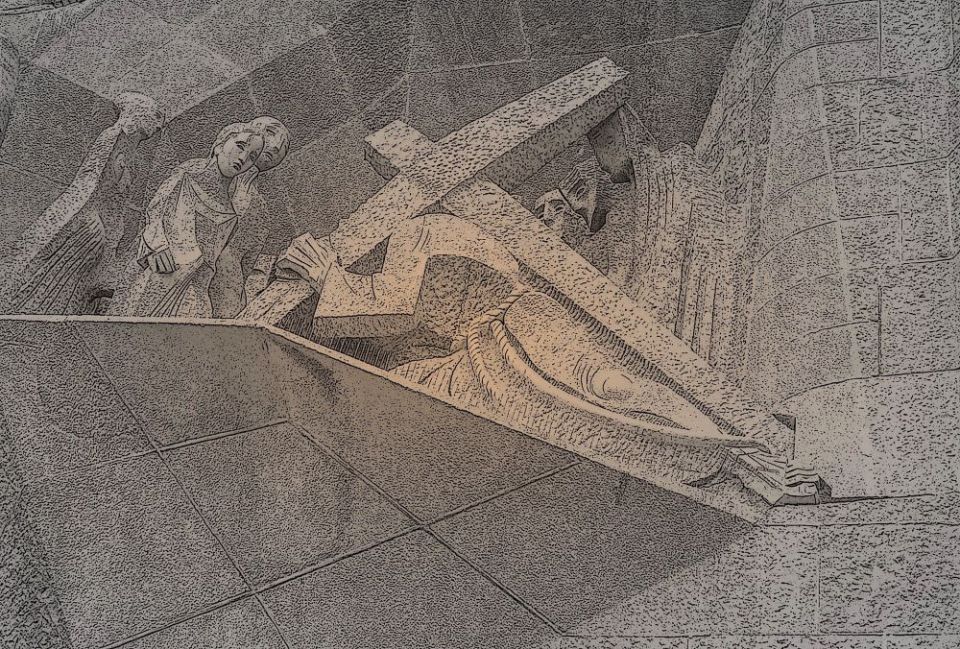I have lived many Lenten seasons, but this one is a little different. Aware that Ash Wednesday was coming, I began to reflect on what Lent is all about, especially for a religious person. That made me resolve to live the season consciously aware of what is needed of me. In my community we always take time to prepare ourselves to get into the season, so I fully chose to live this one to the best of my ability.
Prayer, fasting and almsgiving — the three observances characteristic of Lent — are meant to help us be united with God and with one another. These three practices are external but have an interior meaning. This time, I am determined to practice them with deep awareness that they are for my spiritual benefit. In a personal way, this year, the relationship between these three pillars and my spiritual growth has become concrete.
As my forehead was signed with the ashes, I was declaring to all the congregants with me that I will practice these exercises fully, and that as I pray, fast and give alms, my relationship with God and my fellow humans will improve.
My good relationship with God, my brothers and sisters signify that conversion is taking place in me, that I am becoming a better person and committing myself to something that demands my conscious effort. Things will not just happen; I have to be an active participant. This suggests that my proclaimed values are to correspond with my lived experiences. Whatever I do is to be done with God and for God.
Advertisement
Advertisement
The three observances help me to recognize my need for God. Facing my quest for the divine during prayer, I thank God for graces received and seek help to live a meaningful life. I begin to see the relevance of what Jesus says: "How blessed are you who are poor: the kingdom of God is yours" (Luke 6: 20b).
The relationship between Lent and the theme of being poor is making sense now. I realize I am poor — hungry and thirsty for God — as I attend to those lacking socially, economically, spiritually and psychologically. Going beyond meeting material necessities, I can give a listening ear, a helping hand and encourage others to appreciate who they are. This is the gift of presence.
In his book The Beatitudes: Road to Happiness Bishop Emeritus Rodrigo Meija writes: "the poor though without merit on their part are called happy" (and my immediate reaction is: "why?") He answers: "the poor are the object of the compassion and mercy of God." Now I realize that the attitude of being poor is the channel through which I can meet God, and Lent gives this chance. The poor have a particular attitude towards life and God. This is the spirit we are called on to embody.
So, the three pillars of Lent invite us to seek God. In prayer, we unite our hearts with God. This is a very significant moment. The transfiguration of Jesus happened when he was at prayer (Luke 9:29). This could also be our experience. There's a common expression: "You cannot pray and remain the same." This is what Lent should produce in us, and it will show in our lives. We become more generous, faithful to our commitments and ministries, and able to overcome our addictions.
In addition to telling God about my own situation in my prayer, bringing the needs of the world keeps me attuned to what is happening. We need this disposition now more than ever before, since our society has gone through a lot of suffering from the effects of COVID-19. The social fabric has not been spared — people lost their loved ones, changing family dynamics.
Additionally, due to tough economic times, some people have lost homes and jobs. In many instances, children had to transfer to public schools, which in some cases offer lower quality education. There have been a lot of changes in people’s lives, demanding us to pray for one another.
Correspondingly, almsgiving could not be more significant than it is now. Many people are hungry, in need of clothing or school fees for their children, and others are sick and not able to afford medical care. When I set out to give alms with a clean heart, I realize that God is there. He is in the person I am sharing my resources with and He is in me who am offering them material and other forms of support. This tests our generosity; how readily do I share? What do I give? Sometimes there is the temptation to give what I can do without, and I do not allow myself to feel the pinch of parting with something I treasure.
Through fasting, I learn to be disciplined. I abstain from things that I cherish as a sign of choosing God above other things. The practice has been that when we fast, what we save through our fasting is given to those most in need. Again, this links us with God, and I realize that the poor are the place where the "ear of God meets humanity."
Jesus is in the desert these 40 days. He is the son of God who comes to save us, the one who will transform the face of the world and forgive our sins. He is a God who suffers with his people. Jesus was tempted, so as his followers we are also going to be tempted as we observe the Lenten practices.
Jesus overcame the temptations presented by the evil one. But in the Gospel of Luke (4:13) we are told that "the devil left him until the opportune moment." This means that the devil did not go. He is still around. So, we need to seek God's help constantly and his Holy Spirit will guide us when the temptations come. When we experience challenges in our prayer life, our generosity and abstinence from our various addictions, Jesus teaches us that we can overcome.
The common denominator here is that as all of us pray, give alms and fast, we have to ask ourselves whether what people see on the outside reflects what we are inside our hearts. This is a wake-up call, and it should make us think twice before declaring that we are living the spirit of the Lenten season. It invites us to constantly examine our conscience.
We learn from Jesus that the Lenten season is not about attracting attention (Matthew 6:1), neither is it for people to see us (Matthew 6: 5b), nor is it about looking unsightly to let people know that we are fasting (Matthew 6:16). People may have praised us for our "heroic" deeds, but they only flattered us and did not please God. May God help us to rise above our own desire to be glorified and allow our deeds to glorify him instead.
This way we may be able to rise with him at Easter. We shall have a reason to celebrate since we will have made a sincere journey with our Lord.
Like what you're reading? Sign up for GSR e-newsletters!



